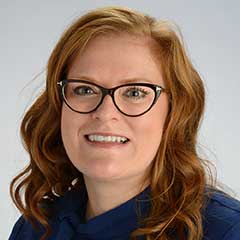
Nancy Stewart, DO, MS

Nancy Stewart, DO, MS

Nancy Stewart, DO, MS
When Nancy Stewart, DO, MS, talks about her desire to help patients with lung disease, you can feel her passion.
“If you can make a difference at the bedside for one patient in the trajectory of their health and their care—that is what is most meaningful for me,” she said.
Dr. Stewart is an Assistant Professor, Pulmonary, Critical Care and Sleep Medicine, at the University of Kansas Medical Center, and she’s a two-time recipient of the CHEST Research Grant in Sleep Medicine in 2020 and 2022.
With her 2020 grant, Dr. Stewart investigated barriers that hospitalized patients with sleep apnea and COPD encounter during the discharge process, as well as the challenges that acute care team members encounter when serving these patients.
Her goal was to effect positive change by identifying the challenges and developing an intervention plan to help mitigate them.
According to Dr. Stewart, patients with COPD are at a high risk of hospital readmission, as are patients with sleep apnea as a concurrent diagnosis.
“When you take those two diagnoses together, it makes the situation more complex, and the patient is at higher risk for readmission,” she said. “I don’t know if the acute health care team members nor the patients are even aware of this.”
To implement her study, Dr. Stewart conducted qualitative interviews with physicians, nurses, respiratory therapists, case workers, and patients. As she spoke with the interviewees, similar themes emerged.
The team members and patients consistently named insurance barriers, time commitment constraints, and rampant issues with access to care as significant—and deeply interconnected—challenges.
Time commitment barriers meant team members often couldn’t spend enough time with patients to make sure they understood the diagnosis and next steps. Supply and access issues affected patients’ ability to acquire the medications and devices they needed.
Many patients are admitted through the ER, and team members often struggle to secure reliable access to outpatient follow-up appointments. As a result, patients often use the ER as their clinic because they can’t be seen in a formal clinic setting, Dr. Stewart said.
“It became clear to me that each one of these barriers could be their own individual research projects with strategies for mitigation and intervention,” she said.
“The challenge for our team as we worked through the data was [shifting] the lens towards, ‘How are we going to figure out [intervention plans] that are going to be the most feasible in terms of size, but also be the most impactful?’”
Dr. Stewart’s second CHEST-supported project, which began in 2022, was similarly spurred on by her desire to help patients personally and individually.
One of the key aspects of the study has been collecting patient information guides from medical societies and sharing them with patients. In this ongoing project, Dr. Stewart has been asking patients which guides are most beneficial and clear. She hopes to understand if the resources being created are reaching patients and serving them well.
“We have to ask ourselves as clinicians: Are we even speaking [patients’] language, and are the materials we provide at the appropriate health literacy level?” she said.
Another part of the study is a data analysis of patients with overlapping diagnoses of sleep apnea and COPD in the University of Kansas Health System.
Dr. Stewart is investigating if there are disparities that disproportionately impact patients with certain social determinants of health or specific race or gender identities. She and her team will look at how they might bring about change for these patients.
As Dr. Stewart discussed her research, she pointed to the importance of the CHEST grants in allowing her to collect pilot data, which is critical for larger grant applications she may pursue in the future.
“The external validation that comes from receiving grants like these are monumental,” she said.
“It sets people up for larger projects, larger funding, and the continuation of their trajectory. I am incredibly grateful for the opportunity that the CHEST Research Grants have provided.”